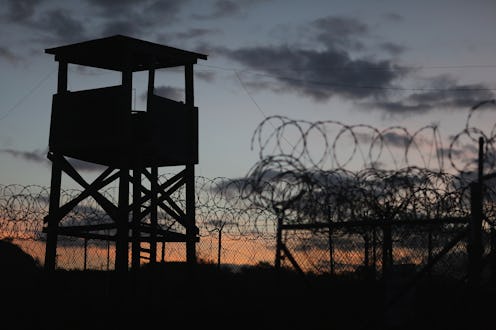News
Guantanamo Detainees Want Their Hobby Lobby Rights
In the immediate aftermath of the Supreme Court's ruling in the Hobby Lobby case, there's already been evidence that its influence will be far more widespread than Justice Alito's majority opinion claimed. But while challenges from Christian institutions wanting various conscience exemptions was surely something the Court could've seen coming, they probably didn't expect this — two Guantanamo Bay detainees are suing on religious freedom grounds, in essence arguing that they want their Hobby Lobby rights.
The two men, Emad Hassan and Ahmad Rabbani, have been detained at the prison facility since 2002 — over a decade in captivity, without standing trial or facing any charges. As reported by MSNBC, the two men's participation in the widespread hunger-strikes amongst the detainee population prompted officials to bar them from attending communal prayers for Ramadan.
Their lawyer, Cori Crider, is seeking for this ban to be lifted, and she's citing the religious freedom protections afforded to Hobby Lobby as argument in favor of his clients. The argument goes: If Hobby Lobby can achieve the trappings of legal personhood, shouldn't these living, breathing people get the same rights?
Specifically, Crider is arguing that the Hobby Lobby ruling should be interpreted to extend her clients' rights under the Religious Freedom Restoration Act (RFRA). As she said in a statement:
Religious freedom is one of the main reasons the Founding Fathers threw off British rule, and it’s as central to our life as Americans in 2014 as it was in 1776 –—so why are the authorities at Guantánamo Bay seeking to punish detainees for hunger striking by curtailing their right to pray? If, under our law, Hobby Lobby is a ‘person’ with a right to religious freedom, surely Gitmo detainees are people too.
This is not, as it happens, the only lawsuit these two detainees are involved in — they're also filing a suit, along with fellow detainee Abu Wa’el Dhiab, to try to halt the force-feedings that hunger-strikers are subjected to. Being force-fed is by all accounts a terrible thing to experience, so much so that many observers, including officials at the UN, consider it a form of torture.
Whether an American court will actually be swayed by religious freedom considerations, in either case, is difficult to say. Regardless of any specific arguments about the men and the Hobby Lobby angle itself, it's a potentially loaded situation for any judge forced to make the call.
According to MSNBC, Rabbani has admitted to working with al-Qaeda and with 9/11 mastermind Khalid Sheikh Mohammed, while lawyers for Hassan claim he's been cleared for release for years — a grossly common fate. Regardless of any specific arguments about the men and the Hobby Lobby angle itself, it's a potentially loaded situation for any judge forced to make the call.
Moreover, two district court rulings have already broken the other direction, finding that detainees aren't protected under the RFRA, setting an easy precedent for future judges to follow suit. Crider clearly hopes that the high-profile expansion of religious rights brought about by Hobby Lobby will prove to be a game-changer, but for now, we can only wait and see.
Correction: A previous version of this article identified Cori Crider as male. We regret this error.
